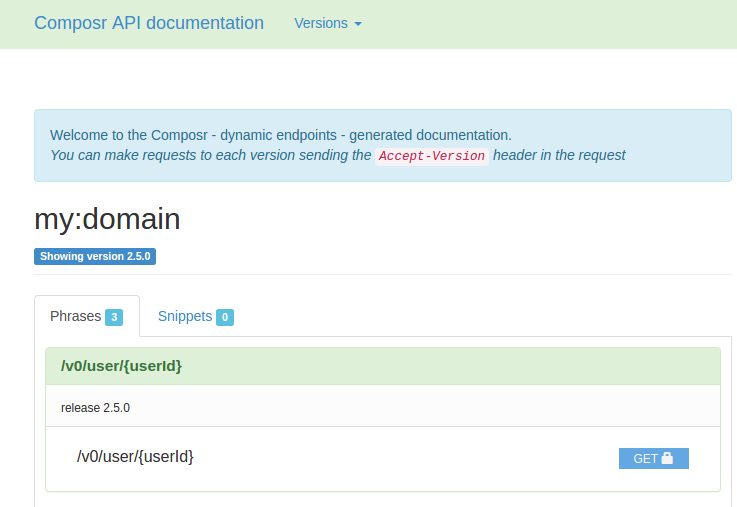
#Composr









Overview
Composr is a nodeJS opinionated server for executing dinamically created endpoints, it's original purpose is to serve as a middleware for the Corbel - microservices generic backend - , but it's capabilities are growing.
It uses the composr-core API for executing random pieces of code that the developers pushes to the Composr API.
This random pieces of code, called Phrases or Snippets are model definitions for endpoints and reusable utilities.
Features
- Enable/disable endpoints in runtime dynamically!
- Built in PM2 configuration for cluster mode
- Bunyan Access logs
- Winston Logs (debug, info, warn, error)
- Dynamic versioning support
- Autogenerated API documentation
- RabbitMQ communication for endpoints updates
- Status and Healthcheck endpoints
- Keymetrics and Newrelic integration
- Docker Ready!
- Configurable middlewares for each endpoint
- Mock: It mocks the response of the endpoint with an autogenerated object
- Validate: It validates the input object schema for POST/PUT requests
- Auth Middlewares: Ensures that the endpoint receives a Corbel Auth Token
- Cache Middlewares: Configure which endpoints will be cached and for how long.
- ...
- Corbel ready, thanks to Corbel-js
QuickStart
Configuration
One way of starting composr is using it as a command, corbel-composr.
This will search for the default configuration under a config folder in the current directory. Composr uses the NPM config module for the configuration. So it will basically search for a development.json file under the config folder.
If NODE_ENV is not set in the environment, a default value of development is used.
Default config file
{
"serverName" : "CompoSR",
"bodylimit" : "50mb",
"port": 3000,
"rabbitmq": {
"host": "",
"port": "",
"username": "",
"password": "",
"reconntimeout": 10000,
"event": "class com.bq.corbel.event.ResourceEvent",
"forceconnect": false,
"heartbeat" : 30
},
"bootstrap.retrytimeout": 10000,
"services": {
"timeout": 5000,
"retries": 30,
"time": 1000
},
"corbel": {
"credentials": {
"clientId": "",
"clientSecret": "",
"scopes": "composr:comp:base"
},
"options": {
"urlBase": ""
}
},
"bunyan": {
"log" : true,
"syslog" : true,
"stdout": false,
"streamServer": false
},
"composrLog": {
"accessLog" : true,
"accessLogFile" : "logs/access.log",
"logLevel": "error",
"logFile": "logs/composr.log",
"syslog" : false
},
"newrelic": {
"enabled": false,
"name": "",
"key": ""
},
"keymetrics": true,
"execution": {
"vm": false,
"gc": false,
"timeout": 40000,
"local": false
}
}
Almost all of the vales in the configuration file can be overwriten by environment variables, this can be useful if you use Docker, Travis or any other tool that could send environment variables to configure your server.
Environment variables
SERVER_NAME (Composr 2.0)
PORT (3000)
CREDENTIALS_CLIENT_ID
CREDENTIALS_CLIENT_SECRET
CREDENTIALS_SCOPES
URL_BASE
ACCESS_LOG => winston access log
ACCESS_LOG_FILE => winston access log file
LOG_LEVEL => winston log level
LOG_FILE => winston log file
BUNYAN_LOG(true) => Bunyan logs
BUNYAN_SYSLOG(true) => Send bunyan stream to syslog (127.0.0.1:514)
BUNYAN_STDOUT(false) => Bunyan output in terminal
BUNYAN_STREAM_SERVER (null) => Composr Stream Server endpoint
RABBITMQ_HOST
RABBITMQ_PORT
RABBITMQ_USERNAME
RABBITMQ_PASSWORD
RABBITMQ_FORCE_CONNECT => Only launch composr if rabbit is connected
RABBITMQ_HEARTBEAT => Heartbeat for the rabbitmq connection
SERVICES_TIMEOUT
SERVIES_RETRIES
SERVICES_TIME
KEYMETRICS (true) => Keymetrics active
NRACTIVE => New relic active
NRAPPNAME => New relic app name
NRAPIKEY => New relic api key
TIMEOUT=> Endpoint timeout
LOCAL_MODE=>If set to "true" it skips loading the endpoints from a remote server and uses the local files
Creating your endpoints:
What are Phrases or Snippets?
You can generate and publish your phrases and snippets by using the composr-cli. Currently under development
Bootstraping a project:
composr init will generate a basic structure for your Phrases project.
Once you bootstrapped some phrases, just run corbel-composr in the current folder and the server will be ready at the port 3000.
Routing endpoints
Corbel-Composr has a similar routing mechanism than restify. You can define urls by following this conventions:
:param : Url parameteruser : Fixed path value
Some examples
user/:userIduser/status/:parameterthing/one
{
"url": "paramsExample/:pathparam",
"get": {
"code": "res.status(200).send('path param: ' + req.params.pathparam + ', query param: ' + req.query.queryparam);"
},
"post": {
},
"put": {
}
}
Versioning your endpoints
Composr can take care of multiple endpoints and multiple versions for each endpoint. It uses the semantic versioning for executing different code for each endpoint.
For example, if you published the following phrases to Composr:
{
"url": "user/:userId",
"version": "3.1.0",
"get": { ... }
}
{
"url": "user/:userId",
"version": "4.0.0",
"get": { ... }
}
Then you could request executing the 3.x version by sending the Accept-Version header with a ~3 value, as seen in restify.
Documentation
Composr autogenerates documentation when navigating to http://localhost:3000/my:domain/doc. The documentation is generated by fulfilling the example documents that composr-cli creates when generating a phrase model.
See an example:

Phrase Middlewares
We offer a set of plugable add-ons that will automatically add functionality to your phrases.
These middlewares or hooks are executed before or after the code on your phrase.
You can specify them on the phrase's spec at a method level like this (order is important!):
{
"url": "resource",
"get": {
"middlewares": [
"auth"
"validate",
"mock"
],
"doc": {
...
}
Among the available middlewares you can find:
- 'corbel-auth-client': Automatic corbel authentication for clients
- 'corbel-auth-user': Automatic corbel authentication for users. A new attribute 'userId' will be available on the phrase for a succeeding user token.
- 'validate': Automatic validation of path params, query params and body based on documentations' schema
- 'mock': Mocked responses based on schema or example from documentation
Logs
Composr is shipped with built-in bunyan and winston support.
Winston logs:
You can set logFile and logLevel in your config file.
Available log levels can be found at winston's npm page:
Bunyan Logs:
Bunyan logs are enabled by default. You can disable them by turning bunyan.log to false in your configuration.
Tests
npm test
Coverage
npm run coverage
Debug
Requires node-inspector
npm install -g node-inspector
Run in a docker container
-
clone repo
-
build image
docker build -t <username>/corbel-composr .
-
run container
docker run -d -p 3000:3000 --name="corbel-composr" <username>/corbel-composr
-
start/stop container
docker start/stop corbel-composr
Reference










